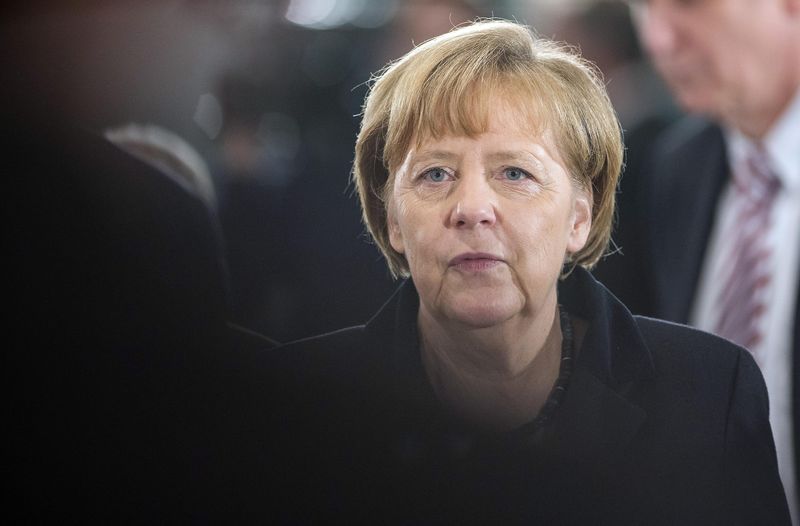By Stephen Brown
BERLIN (Reuters) - German Chancellor Angela Merkel faces challenges from allies and rivals to confront a rising tide of anti-immigrant sentiment driving increasingly popular anti-Islam marches in the city of Dresden every Monday.
With thousands expected at the next march, Merkel is in a dilemma. Her security officials are warning of an increase in hate crimes, while opinion polls show support for the marchers' calls for a tougher German immigration policy.
"There is a visible rise in xenophobic crime countrywide," police chief Holger Muench told Welt am Sonntag, which like most German Sunday newspapers focused on Monday's march by a group calling itself PEGIDA - an acronym for "Patriotic Europeans against the Islamisation of the West".
There has been a spike in both anti-Muslim and anti-Semitic sentiment this year, with right-wingers joining soccer hooligans to fight Salafist Muslims and a spate of attacks on Jews. At the same time, with record levels of immigration, Germany has become Europe's biggest recipient of asylum-seekers.
Merkel said on Friday there was "no place in Germany" for hatred of Muslims or any other minority.
But her Social Democrat (SPD) coalition allies, the opposition Greens and the fast-growing Eurosceptic party Alternative for Germany (AfD) all seem to have spotted a chance to undermine the popular chancellor, whose approval rating was 76 percent in a poll in the Bild am Sonntag newspaper.
The SPD, seething at Merkel's remarks that they had declared political bankruptcy by allying with former communists in one eastern state, challenged her to respond to what senior SPD lawmaker Thomas Oppermann called "probably the biggest issue of the next decade".
Greens leader Cem Oezdemir, who will join a counter-protest in Dresden, urged her "to recognise clearly that Germany is a country for immigrants and benefits from them". In fact, Merkel often says Germany needs more immigrants to boost its workforce.
But her Christian Democrats' (CDU) mixed response to PEGIDA - some CDU officials urged understanding for the motivation of the marchers, while the SPD simply blasted the organisers as "Nazis in pinstripes" - means she risks being outmanoeuvred.
The marches have already spawned copycat protests in cities to the west like Duesseldorf, which have larger immigrant populations than Dresden, home to very few of Germany's 4 million Muslims.
Hajo Funke, a Berlin professor, said many of the estimated 10,000 people who marched last week voiced vague "discontent with society and their own lives", while the organisers played on fears of armed insurgents like Islamic State and al Qaeda.
Interior Minister Thomas de Maiziere said there was no risk Germany would be "Islamised" but saw an "overlap" between PEGIDA and the AfD, which is trying to establish itself as a law-and-order party. The AfD has spotted this too and one of its leaders, Alexander Gauland, plans to be in Dresden on Monday.
"We are the natural allies of this movement," said Gauland.

This could trigger fresh debate about how to deal with the AfD, which the CDU has so far dismissed as a fringe group which quietly recruits right-wing extremists.
(Reporting by Stephen Brown; Editing by Tom Heneghan)